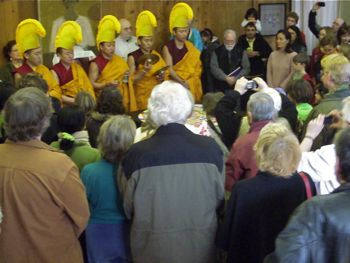All the prophets seem to get sanitized. Take, for example, the ancient Hebrew prophet Amos, whom I have recently been re-reading. It was Amos, of course, whom Martin Luther King, Jr., quoted in the famous “I Have a Dream” speech:— “let judgment run down as waters, and righteousness as a mighty stream.” Amos looked around at his society and saw that those in power trod upon the poor, and took from them “burdens of wheat”; he heard wailing in the streets; and he made violent-sounding protests against the injustice he witnessed.
Amos gets sanitized just like Martin Luther King, Jr. Orthodox Christians manage to turn Amos’s prophecies into some kind of call for personal salvation; atheists mock him for his belief in God but don’t go any further than that; and religious liberals simply ignore him. All these groups seem to ignore the fact that Amos was writing powerful protest literature that was designed to make us feel horribly uncomfortable about the way we treat other people, especially those who have less power than we do.
It’s not too far-fetched to think of Martin Luther King, Jr., as a sort of lesser Amos: someone who set out to afflict the comfortable, a troublemaker who wanted true justice for all persons, a somewhat cantankerous and definitely edgy kind of a guy. And like Amos, King gets bowdlerized: used to promote self-esteem or to keep kids from fighting; mocked for his very real character flaws; or simply ignored. In celebration of Martin Luther King, Jr., Day, it’s worth quoting some more of that famous quotation from Amos, to learn how it is that Amos thinks his God will make justice roll down like waters:
Woe unto you that desire the day of the Lord!
to what end is it for you? the day of the Lord
is darkness, and not light.
As if a man did flee from a lion, and a bear met
him; or went into the house, and leaned his
hand on the wall, and a serpent bit him.
Shall not the day of the Lord be darkness, and
not light? even very dark, and no brightness
in it?
I hate, I despise your feast days, and I will not
smell in your solemn assemblies.
Though ye offer me burnt offerings and your
meat offerings, I will not accept them: neither
will I regard the peace offerings of your fat
beasts.
Take thou away from me the noise of thy songs;
for I will not hear the melody of thy viols.
But let judgment run down as waters, and
righteousness as a mighty stream.
— Amos 5.18-24, KJV
Happy birthday to Martin Luther King, Jr.:— a preacher, a prophet, someone who took Amos’s God very seriously.






